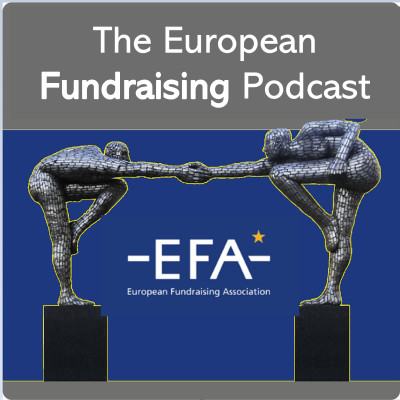European Fundraising Podcast
The European Fundraising Podcast is produced by David Klajman - co-founder of Fidelis - in partnership with EFA.
Here we discuss with fundraising leaders their thinking and approach, how they are adapting to the changing environment for nonprofits and what they are doing to strengthen and build sustainable supporter relationships.
Created by fundraising experts for fundraising experts, this is your opportunity to hear some fantastic ideas for raising funds, while listening to great people who will inspire you.
How to listen to it?
Tune in by searching for «European Fundraising» on your favourite podcast application (Apple Podcast, Spotify, Google Podcast…).
Or to listen here and now, click on one of the episodes below or visit the European Fundraising Podcast homepage at the link below.
Listen here
Episode 1: Eugenia Mazurenko, Zagoriy Foundation (Ukraine): Fundraising from a war zone
Imagine fundraising while at war, pivoting from delivering funding to humanitarian aid and needing to bridge the gap between INGOs and grassroots organisations. In our first European Fundraising podcast, we hear this moving account from Eugenia, CEO of the Zagoriy Foundation in Ukraine. She shares her story of fleeing the invasion to find her family a safe place to live, while working to support civil society initiatives across the nation. Eugenia appeals to the European fundraising and philanthropy community for support.
Episode 2: Araba Pilic, Stiftung Menschen für Menschen (Germany): Are fundraisers changing society?
Araba Pillic works in communication and fundraising for Stiftung Menschen für Menschen, a German NGO with more than 600 employes in Ethiopia. Araba’s experience is really diverse, she has lived different lives before working for an NGO, from her youth in a multi cultural family to being the Queen in the Lion King musical in Berlin. She defines herself as a social activist and in this episode we discuss with her how fundraising and activism are related, and why we should revolutionise our way of thinking in order to adapt our fundraising to a new generation of donors.
Episode 3: Richard Spencer, About Loyalty (UK): Is a fundraiser's success only measured by money?
Richard Spencer is director of About Loyalty – a research-based consultancy in the UK specialising in helping nonprofits grow supporter loyalty, and prior to this held senior positions at RSPB, Scope and The Children's Society. In this episode, he explains why fundraisers shouldn’t focus only on the money they get for their organisation, and how to maximise both the supporter experience and fundraising at the same time.
Episode 4: Frederic Theret, Fondation de France (France): How can my organisation fundraise in other countries?
Frederic Theret is executive director of marketing and development at leading philanthropy network in France Fondation de France where he has spent the last decade. He has also previously held posts at Action Contre Le Faim and Institut Pasteur, and prior to this spent ten years working in communication in the commercial sector. In this episode, he explains how “cross border” fundraising is going to grow in Europe.
Episode 5: Andreas Drufva, The Swedish Society for Nature Conservation: Why reacting quickly to the news can attract new donors.
Andreas Drufva is marketing director at The Swedish Society for Nature Conservation, which has been at the centre of a big political debate in Sweden over the last months. In this episode, he explains all: how it happened, how they handled it, and what it tells us about our time and new ways to fundraise. He also provides tips on how to engage donors long-term, how to organise your NGO to make it more efficient, and how to manage a fundraising team.
Episode 6: Birgit Winterhalter, Caritas Germany: What is the mentality of a good fundraiser?
Birgit Winterhalter is head of fundraising at Caritas Germany. Caritas is one of the largest nonprofit organisations in the world, and Birgit has been working there for 30 years – for her, she says: "Working for Caritas is not a job, it’s a mission". In this episode, she explains to us where this energy and passion for her job comes from, and why she thinks it's so important to have this as a fundraiser. She also provides an overview of fundraising in Germany.
Episode 7: Laure Vienot, LVT Consulting: How to start fundraising abroad for your NGO
Laure Vienot is a French fundraising consultant and founder of LVT Consulting. Specialising in international philanthropy, in this episode, Laure talks about her path into philanthropy after working in engineering and then theatre in the US, and how she works to help NGOs take their fundraising abroad. For NGOs considering this themselves, she explains what questions to ask internally, what the first steps should be, how to prepare, and what to expect.
Episode 8: Phillip Rothwell, Warwick Independent Schools Foundation: How to keep learning through your fundraising career
Phillip Rothwell is the Director of Development for Warwick Independent Schools Foundation in England, and a CFRE. In this episode, Phillip talks with David about the importance of continuing to develop fundraising in the education sector in order to maintain quality and access, and how to do it. He also talks about the need to continue learning throughout your fundraising career, explaining how CFRE works, and the benefits of becoming one for a fundraiser.
Episode 9: Charlotte Rydh and Jan Gregor, EFA president & vice president, What are the major trends in European fundraising?
In this episode, EFA's president Charlotte Rydh, and vice president Jan Gregor discuss the major fundraising trends across Europe, revealed earlier this year in EFA's 2022 Nonprofit Pulse report, as well as EFA's pivotal role in upholding fundraising professionalism and supporting NGOs throughout Europe.
How can you contribute to the podcast?
To suggest an interviewee or topic for the European Fundraising Podcast, please contact EFA's editorial team here.
Disclaimer
All opinions presented in this podcast belong to interviewees contributing to this programme. These views do not necessarily reflect the views of EFA, nor are they endorsed by EFA. They are provided for informational purposes only.

